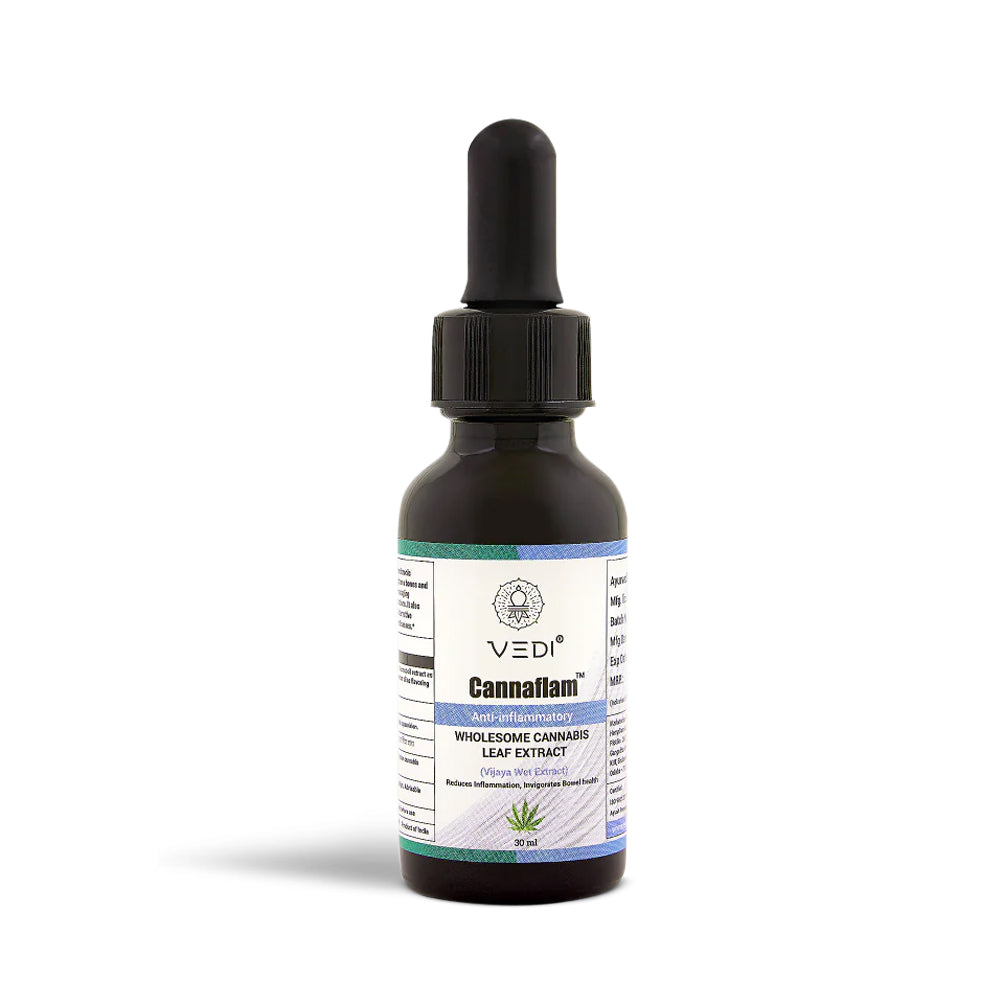IBS Ayurvedic Treatment in Bangalore

Discover a holistic approach to alleviate persistent digestive issues with Ayurvedic treatment for Irritable Bowel Syndrome (IBS) at Vedi Wellness Center in Bangalore. Learn more.
Are you regularly experiencing persistent stomach pain, indigestion, bloating, constipation, or diarrhea?
Despite frequent visits to your doctor, undergoing tests, and taking medication, if you still find yourself grappling with unresolved symptoms, there's a possibility that you may be dealing with Irritable Bowel Syndrome (IBS).
In Bangalore, where the fast-paced lifestyle and high-stress levels are the norm, the impact of stress on digestive health cannot be underestimated. While conventional treatments do work, finding lasting relief can be elusive.
This is where the ancient wisdom of Ayurveda steps in! Offering a holistic approach, IBS Ayurvedic treatment in Bangalore is a beacon of hope.
Let’s also explore the transformative journey towards digestive well-being through the best Ayurvedic medicine and treatment for Irritable Bowel Syndrome (IBS) in Bangalore at Vedi Wellness Center.
Overview of Irritable Bowel Syndrome (IBS)
Irritable bowel syndrome (IBS) is a gastrointestinal (GI) condition marked by recurring episodes of abdominal pain or discomfort in conjunction with changes in bowel habits.
Affecting individuals of all ages, including children, IBS is more prevalent in women than men, with women experiencing the condition twice as often.
The precise cause of IBS remains elusive, and despite routine tests showing normal digestive system functioning, it is classified as a functional gastrointestinal (GI) disorder.
There is evidence pointing towards potential causes such as abnormalities in gut motility, bacterial changes in the gut microbiota, interpretation of pain signals from the central nervous system related to the gut, and improper functioning of the immune system.
Exploring the Gut and the Mystery of IBS
The gut is a complex ecosystem hosting a variety of microorganisms, collectively known as the gut microbiota. This microbiota contributes to digestion, supports the immune system, and protects against disease-causing bacteria.
The Gut-Brain Axis (GBA) is a crucial connection between the gut and the brain, playing a role in the onset of IBS.
The enteric nervous system (ENS), often referred to as the "little brain" in the gut, governs gut reactions to food, controlling digestion, nutrient absorption, and waste elimination.
Dysfunctional interactions between the Gut-Brain Axis and the gut microbiome may lead to IBS
Symptoms of IBS:
IBS symptoms can strike at any time and may vary over time. Key symptoms include:
- Abdominal pain or discomfort is often relieved by a bowel movement.
- Bloating, a sense of gaseousness, and changes in bowel habits, including constipation and/or diarrhea, are also common.
In women, symptoms may worsen during specific times in the menstrual cycle due to hormonal influences on gut function. Familiarity with changing symptoms aids doctors in differentiating IBS from other conditions.
Ayurvedic Perspective on Digestive Disorders
Ayurveda, a holistic healing system that dates back thousands of years, views health as a delicate balance between the mind, body, and spirit. Digestive disorders are considered a manifestation of an imbalance in the doshas – Vata, Pitta, and Kapha.
These doshas represent different combinations of the five elements (earth, water, fire, air, and ether) and govern various physiological and psychological functions in the body.

Agni: The Digestive Fire
At the heart of Ayurvedic understanding of digestion lies the concept of agni, often referred to as the digestive fire. Agni is responsible for breaking down food, absorbing nutrients, and eliminating waste. It is a crucial aspect of maintaining overall health in Ayurveda. There are four types of agni:
- Manda Agni (Sluggish Digestive Fire): This type of agni results in incomplete digestion, leading to the accumulation of toxins in the body.
- Tikshna Agni (Sharp Digestive Fire): An excessively strong digestive fire can lead to the rapid digestion of food, causing imbalances and leading to conditions like acidity and inflammation.
- Vishama Agni (Irregular Digestive Fire): This type of agni is characterized by erratic digestion, causing fluctuations in appetite and energy levels.
- Sama Agni (Balanced Digestive Fire): The ideal state of agni, where digestion is efficient, and nutrients are properly assimilated.
When your digestive fire, or agni, is compromised, you may encounter discomforting digestive issues such as occasional heartburn, constipation, gas, diarrhea, bloating, and other related symptoms.
Understanding IBS in Ayurveda
In Ayurveda, the ailment known as Grahani roga shares similarities with Irritable Bowel Syndrome (IBS). Grahani roga arises from imbalances in dosha (body humors) and various bodily systems (Srotas).
The systems implicated encompass annavaha (gastrointestinal), purishavaha (excretory), manoavaha (psychological), vatavaha (neurological), ahara (dietary), vihara (behavioral), agni (major metabolic factor), and kostha (gut health).
These components intricately interact, forming a complex and reciprocal network, necessitating a comprehensive systems approach.
Symptoms manifest as disruptions in bowel patterns, such as:
- Constipation or loose stools
- Alterations in frequency
- Accompanied by pain or burning sensations
- Foul-smelling characteristics
- Bloating
- Loss of appetite
- Debility
Role of Doshas in IBS
Ayurveda attributes the manifestation of IBS to an imbalance in the doshas. Each dosha contributes uniquely to the symptoms experienced by individuals with IBS:
- Vata Imbalance: Excess Vata may lead to symptoms such as abdominal pain, bloating, and irregular bowel movements. Factors like stress, irregular routines, and cold, dry foods can aggravate Vata.
- Pitta Imbalance: Aggravated Pitta can result in inflammation of the gastrointestinal tract, leading to symptoms like diarrhea or acidic sensations. Spicy, hot, and acidic foods, as well as emotional stress, can contribute to Pitta imbalance.
- Kapha Imbalance: Predominance of Kapha may cause sluggish digestion, leading to symptoms like constipation and a feeling of heaviness. A sedentary lifestyle and an excess of heavy, oily foods can worsen Kapha imbalance.
By embracing Ayurvedic principles, individuals can not only alleviate symptoms of IBS but also cultivate a profound sense of well-being through the harmonization of doshas and agni.
Ayurvedic Medicine and Treatment for Irritable Bowel Syndrome (IBS)
While conventional medicine offers relief to many, the fundamental principles of Ayurvedic medicine and treatment for IBS, focus on its holistic approach, natural remedies, and personalized treatment plans tailored to individual constitutions.

Holistic Healing Approach
Ayurvedic treatment for irritable bowel syndrome seeks to address the root cause of the imbalance within the individual's unique constitution. This holistic approach recognizes that physical ailments often stem from imbalances in the doshas – Vata, Pitta, and Kapha – which govern various physiological and psychological functions.
By addressing the root cause, Ayurveda aims to restore harmony to the entire system, promoting long-term well-being rather than temporary relief.
Natural Remedies and Therapies
Ayurveda harnesses the power of nature to promote healing. Natural remedies and therapies play a crucial role in Ayurvedic treatment for IBS.
- Dietary Guidelines: The choice of foods is tailored to the individual's dosha imbalance, with an emphasis on incorporating whole, seasonal, and locally sourced ingredients. Avoiding trigger foods and promoting mindful eating are also key aspects of Ayurvedic dietary recommendations for IBS.
- Herbal Supplements: Ayurvedic herbs are used to alleviate IBS symptoms and restore balance. Common herbs include ginger, fennel, peppermint, and licorice, each offering unique properties to address specific dosha imbalances.
- Yoga and Meditation: Ayurvedic treatment for IBS extends beyond the physical realm to include mental well-being. Practices such as yoga and meditation are recommended to reduce stress, enhance relaxation, and promote a harmonious balance between the mind and body.
Personalized Treatment Plans Based on Individual Constitution
One of Ayurveda's distinguishing features is its recognition of individual uniqueness. Treatment plans are not one-size-fits-all; instead, they are tailored to the specific constitution of each individual.
By understanding an individual's dosha predominance and addressing the underlying imbalances, Ayurvedic practitioners can create targeted treatment plans that encompass dietary recommendations, herbal supplements, lifestyle modifications, and therapeutic practices.
Ayurvedic Strategies for IBS Management
Living with Irritable Bowel Syndrome (IBS) can be challenging the dietary recommendations and lifestyle changes prescribed by Ayurveda are effective in IBS management.
Dietary Recommendations for IBS
|
Vata Dominance |
Emphasis on warm, nourishing foods like soups, stews, and cooked grains to calm the nervous system. |
|
Pitta Dominance |
Cooling and hydrating foods such as cucumbers, coconut, and leafy greens to pacify excess heat in the digestive tract. |
|
Kapha Dominance |
Light, warm, and easily digestible foods like legumes, whole grains, and steamed vegetables to counteract sluggish digestion. |
- Identifying Trigger Foods and Intolerances: By addressing intolerances, one can make informed dietary choices that support digestive balance.
- Individuals are encouraged to keep a food diary, noting the types of foods consumed and the corresponding digestive responses.
- Common trigger foods include dairy, gluten, spicy foods, and certain raw vegetables.
- Importance of Mindful Eating and Meal Timing: In Ayurveda, how we eat is as important as what we eat.
- Mindful eating involves paying attention to the flavors, textures, and aromas of the food, fostering a deeper connection with the act of eating.
- Additionally, meal timing aligns with the body's natural rhythms, emphasizing a substantial lunch when the digestive fire is at its peak and lighter dinners to aid in better digestion during the evening.

Lifestyle Changes for IBS Management
- Stress management: Stress is a known trigger for IBS symptoms, and Ayurveda provides a repertoire of stress management techniques. Practices such as pranayama (breath control), meditation, and daily self-care routines help calm the nervous system.
- Incorporating regular physical activity: Ayurveda recognizes the importance of physical activity for maintaining overall health. Engaging in regular, moderate exercise helps stimulate digestion, alleviate stress, and promote the efficient elimination of toxins. Activities like yoga, walking, and gentle stretching are particularly beneficial for individuals managing IBS.
- Balancing work and rest for overall well-being: Maintaining a balance between work and rest is fundamental in Ayurveda. Overworking or inadequate rest can disrupt the body's natural rhythms, impacting digestion and overall well-being.
Prevalence of IBS in Bangalore
Bangalore, the Silicon Valley of India, is not immune to the global rise in digestive disorders, with IBS being a prevalent concern among its residents. The city's dynamic lifestyle, marked by long working hours, traffic woes, and a mix of traditional and fast-paced living, can contribute to the onset and exacerbation of IBS symptoms.
Apart from stress, dietary factors also play a significant role in the prevalence of IBS in Bangalore. The city's diverse culinary landscape offers a plethora of options ranging from traditional South Indian cuisine to global fast food chains.
While this diversity is celebrated, it also poses challenges for individuals with sensitive digestive systems. Spicy foods, oily snacks, processed foods, and irregular eating habits prevalent in Bangalore can all trigger IBS symptoms and exacerbate the condition.
Addressing the prevalence of IBS in Bangalore requires a multifaceted approach that addresses the underlying factors contributing to the condition. There is a growing interest in exploring alternative and traditional healing modalities.
Best Ayurvedic Medicine and Treatment for IBS in Bangalore
Vedi Wellness Center stands out as a beacon of expertise in IBS management. The center's commitment to patient well-being and its team of skilled Ayurvedic practitioners make it a trusted destination for those seeking the best Ayurvedic medicine and treatment for IBS in Bangalore.
At Vedi Wellness Center, the Ayurvedic doctors specializing in IBS bring a wealth of qualifications and experience to the table.
Trained in the traditional principles of Ayurveda, these practitioners possess a deep understanding of the doshas and tailor treatment plans based on individual constitutions. Their expertise extends beyond symptom management, addressing the root cause of IBS for long-term relief.

Ayurvedic Therapies for IBS Management at Vedi Wellness Center
- Herbal formulations for digestive health: Vedi Wellness Centre employs a customized approach to IBS management, incorporating herbal formulations known for their digestive benefits. These formulations, derived from Ayurvedic wisdom, aim to soothe the digestive system, reduce inflammation, and promote overall gut health. Patients receive personalized herbal remedies based on their specific dosha
- Panchakarma for detoxification of the gut: Panchakarma, a cornerstone of Ayurvedic therapy, takes center stage in IBS management at Vedi Wellness Centre. This detoxification process involves the removal of accumulated toxins from the body, promoting gut balance and optimizing digestive function. Panchakarma at Vedi is tailored to the unique needs of each individual, offering a comprehensive approach to IBS treatment.
- Yoga and pranayama for stress reduction and digestive harmony: Recognizing the intimate connection between stress and digestive health, Vedi Wellness Centre incorporates yoga and pranayama into its IBS management protocols. Tailored yoga sessions and guided pranayama techniques empower patients to actively participate in their healing journey.
As individuals seek sustainable solutions for digestive well-being, Vedi Wellness Centre stands ready to guide them on a journey toward harmony and lasting relief from IBS symptoms.
Patient Testimonials and Success Stories
Have a look at the transformative experiences of individuals who have sought relief from Irritable Bowel Syndrome (IBS) through Ayurvedic treatment at Vedi Wellness in Bangalore.


The Last Word
In conclusion, Ayurvedic treatment for IBS offers a holistic and personalized approach to addressing the root cause of dosha imbalances. The comprehensive strategies, natural remedies, and lifestyle changes advocated by Ayurveda, especially at Vedi Wellness Centre in Bangalore, provide individuals with a transformative journey toward digestive well-being.
FAQs
Can Ayurveda cure IBS completely?
Ayurveda may help manage IBS symptoms through personalized approaches like diet and lifestyle changes, herbal remedies, and stress reduction, but claiming a complete cure varies among individuals.
Can ghee cure IBS?
While ghee, clarified butter used in Ayurveda, can aid digestion, it alone cannot cure IBS. It may be part of a holistic approach involving dietary modifications and lifestyle changes.
Does Triphala cure IBS?
Triphala, an Ayurvedic herbal blend, might alleviate some IBS symptoms by promoting digestive health. However, its effectiveness varies, and it's not a guaranteed cure for IBS.
References:
- Makkawy EA, Abdulaal IE, Kalaji FR, Makkawi M, Alsindi N. Prevalence, Risk Factors, and Management of Irritable Bowel Syndrome in Saudi Arabia: A Systematic Review. Cureus. 2023 Oct 21;15(10):e47440. doi: 10.7759/cureus.47440. PMID: 38021554; PMCID: PMC10658819.
- Agrawal AK, Yadav CR, Meena MS. Physiological aspects of Agni. Ayu. 2010 Jul;31(3):395-8. doi: 10.4103/0974-8520.77159. PMID: 22131747; PMCID: PMC3221079.
- Naik TD, Tubaki BR, Patankar DS. Efficacy of whole system ayurveda protocol in irritable bowel syndrome - A Randomized controlled clinical trial. J Ayurveda Integr Med. 2023 Jan-Feb;14(1):100592. doi: 10.1016/j.jaim.2022.100592. Epub 2022 Nov 9. PMID: 36371363; PMCID: PMC10105243.










6 comments
Pet me ibs h pero me drd body drd thakan weakness